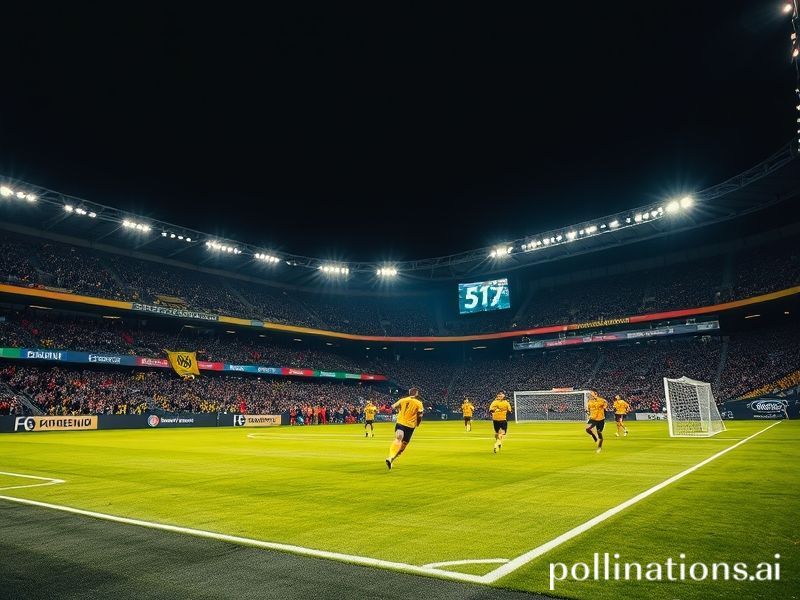Heidenheim 2-1 Dortmund: When the Global Football Machine Got Mugged in Swabia
On paper, 1. FC Heidenheim versus Borussia Dortmund is the footballing equivalent of a hedge-fund gala accidentally booking the same venue as a local Rotary-club bake sale. One club’s marketing deck features Champions-League pedigree, global shirt sales and a Spotify playlist curated by Jadon Sancho’s barber; the other’s highlight reel is a grainy YouTube clip of someone scoring a header against Sandhausen while a lone cow moos in the distance. Yet when the whistle blew last night at the Voith-Arena (capacity 15,000, or roughly the line for bratwurst outside Signal-Iduna-Park), Heidenheim did not merely win 2-1; they administered a short, sharp masterclass in late-capitalist schadenfreude.
Let us zoom out for the non-Europeans in the room. Heidenheim is a Swabian town known, if at all, for manufacturing paper-processing machinery and for being the sort of place where the local newspaper still runs a weekly column titled “Who Died?” Dortmund, meanwhile, is Germany’s self-styled “biggest listed football club,” meaning its balance sheet is fluent in English, Mandarin and hedge-fund panic. One club’s annual budget is rumored to cover the other’s squad lunch. And yet, here we are.
The international implications are delicious. In Singapore, a leveraged-buyout analyst spilled his US$18 matcha latte when the final score flashed on the Bloomberg terminal. In Lagos, a betting syndicate briefly contemplated ritual goat sacrifice to appease whatever cosmic force allowed Dortmund to concede twice in injury time. In Buenos Aires, a pensioner watching on a cracked smartphone nodded knowingly: “Even Messi’s tax accountant saw that collapse coming.”
Football, we are told, is the global language. Last night it spoke fluent irony. Dortmund’s coach, Edin Terzić, spent the week lecturing the press on “game-state management,” which apparently translates to “forgetting how to defend against a team whose right-back also drives the team bus.” Heidenheim’s coach, Frank Schmidt, celebrated by jogging straight to the fans, thereby covering more ground in thirty seconds than some of his players managed all season. Somewhere in the metaverse, a Nike AI-generated highlight reel glitched and rebooted.
The broader significance? In an era when European football risks calcifying into a cartel of oil-drenched super-clubs, Heidenheim’s win is a small, stubborn act of rebellion—like discovering the local library still stocks books printed on paper rather than NFTs. It will not stop the Super League 2.0 PowerPoint circulating in Riyadh boardrooms, but for one night it reminded the planet that spreadsheets occasionally lose to soul, and that the ghost of Leicester City still haunts the algorithms.
Cue the geopolitical footnotes. UEFA’s coefficient calculator coughed politely and revised Germany’s Europa League allocations, which matters only to accountants and the three humans who actually understand the coefficient. In Beijing, state television cut to commercial the moment Dortmund’s final corner sailed into orbit, preferring to air a patriotic documentary about precision ball-bearing production. Meanwhile, in Kyiv, a bomb-shelter screen flickered with the scoreline, prompting a spontaneous cheer that rattled dust from the ceiling. Somewhere in that cheer resides the strange, durable magic of a sport that still insists every postcode has the right to dream.
Dortmund will fly home, fire their set-piece coach, and issue a press release promising “a full forensic audit of stoppage-time protocols.” Heidenheim will reopen the stadium gates so Herr Schmidt can personally thank the 14 traveling fans who arrived by regional train and one borrowed tractor. The universe, indifferent but amused, will roll on.
And that, dear reader, is why a result that barely dented the Bundesliga table still reverberates from Lagos to Lausanne: because occasionally the world conspires to remind us that underdogs remain the only reliable hedge against the tyranny of inevitability. Invest accordingly.







